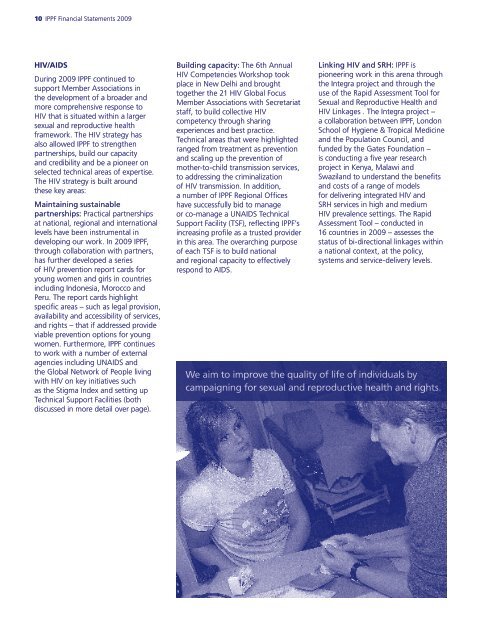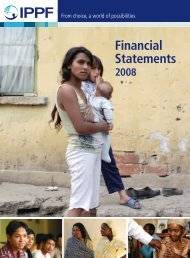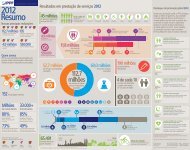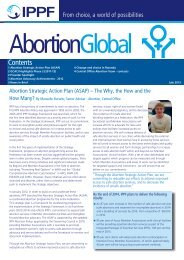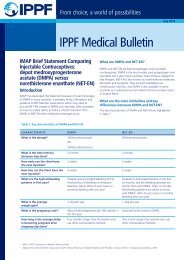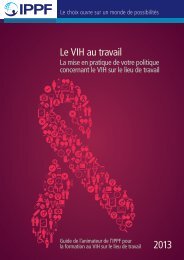Financial Statements - International Planned Parenthood Federation
Financial Statements - International Planned Parenthood Federation
Financial Statements - International Planned Parenthood Federation
Create successful ePaper yourself
Turn your PDF publications into a flip-book with our unique Google optimized e-Paper software.
10 IPPF <strong>Financial</strong> <strong>Statements</strong> 2009<br />
HIV/AIDS<br />
During 2009 IPPF continued to<br />
support Member Associations in<br />
the development of a broader and<br />
more comprehensive response to<br />
HIV that is situated within a larger<br />
sexual and reproductive health<br />
framework. The HIV strategy has<br />
also allowed IPPF to strengthen<br />
partnerships, build our capacity<br />
and credibility and be a pioneer on<br />
selected technical areas of expertise.<br />
The HIV strategy is built around<br />
these key areas:<br />
Maintaining sustainable<br />
partnerships: Practical partnerships<br />
at national, regional and international<br />
levels have been instrumental in<br />
developing our work. In 2009 IPPF,<br />
through collaboration with partners,<br />
has further developed a series<br />
of HIV prevention report cards for<br />
young women and girls in countries<br />
including Indonesia, Morocco and<br />
Peru. The report cards highlight<br />
specific areas – such as legal provision,<br />
availability and accessibility of services,<br />
and rights – that if addressed provide<br />
viable prevention options for young<br />
women. Furthermore, IPPF continues<br />
to work with a number of external<br />
agencies including UNAIDS and<br />
the Global Network of People living<br />
with HIV on key initiatives such<br />
as the Stigma Index and setting up<br />
Technical Support Facilities (both<br />
discussed in more detail over page).<br />
Building capacity: The 6th Annual<br />
HIV Competencies Workshop took<br />
place in New Delhi and brought<br />
together the 21 HIV Global Focus<br />
Member Associations with Secretariat<br />
staff, to build collective HIV<br />
competency through sharing<br />
experiences and best practice.<br />
Technical areas that were highlighted<br />
ranged from treatment as prevention<br />
and scaling up the prevention of<br />
mother-to-child transmission services,<br />
to addressing the criminalization<br />
of HIV transmission. In addition,<br />
a number of IPPF Regional Offices<br />
have successfully bid to manage<br />
or co-manage a UNAIDS Technical<br />
Support Facility (TSF), reflecting IPPF’s<br />
increasing profile as a trusted provider<br />
in this area. The overarching purpose<br />
of each TSF is to build national<br />
and regional capacity to effectively<br />
respond to AIDS.<br />
Linking HIV and SRH: IPPF is<br />
pioneering work in this arena through<br />
the Integra project and through the<br />
use of the Rapid Assessment Tool for<br />
Sexual and Reproductive Health and<br />
HIV Linkages . The Integra project –<br />
a collaboration between IPPF, London<br />
School of Hygiene & Tropical Medicine<br />
and the Population Council, and<br />
funded by the Gates Foundation –<br />
is conducting a five year research<br />
project in Kenya, Malawi and<br />
Swaziland to understand the benefits<br />
and costs of a range of models<br />
for delivering integrated HIV and<br />
SRH services in high and medium<br />
HIV prevalence settings. The Rapid<br />
Assessment Tool – conducted in<br />
16 countries in 2009 – assesses the<br />
status of bi-directional linkages within<br />
a national context, at the policy,<br />
systems and service-delivery levels.<br />
We aim to improve the quality of life of individuals by<br />
campaigning for sexual and reproductive health and rights.


